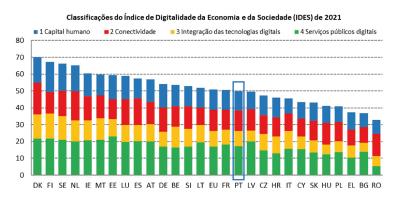The edition of the Economy and Society Digitality Index (IDES) disclosed, on November 13, that Portugal climbed three positions compared to the 2020 edition, now ranking 16th among the 27 Member States of the European Union (EU) and reflecting the digital development efforts of the national society and economy. According to data from the European Commission, Portugal’s positive balance involves increases in absolute terms in 13 of the 33 indicators.
One of the main highlights for Portugal is the increase in the percentage of ICT specialists, which rose from 3.6% to approximately 4%, approaching the EU average (4.3%). The percentage of women ICT specialists has also increased considerably, from 18% to 22%, above the EU average of 19%.
This gender balance in ICT is also addressed in the INCoDe.2030 Program and the Action Plan for the Digital Transition. The “Engineers for 1 day” initiative, for example, reached more than 7,500 students, promoting engineering as part of the national strategy for equality and non-discrimination 2018-2030.
Quantitative evidence of the indicators can be found in the IDES country reports with an overview of policies and good practices specific to each Member State. The Portuguese report mentions the restructuring of INCoDe.2030, carried out in May of this year, with regard to the new governance, objectives and alignment with the most relevant programs and strategies.
The report emphasizes that the country is committed to the development of advanced technologies, through various strategies within the scope of the INCoDe.2030 Program, such as the National Strategy for Artificial Intelligence 2030 and the National Strategy for Advanced Computing 2030. Also within the scope of this Program, Portugal is developing an open data strategy that includes specific initiatives to promote data reuse and sharing.
The “Eu Sou Digital” Program, launched in July 2021, is also highlighted in this document, aiming to train more than one million adults in basic digital skills by 2023, involving a network of 30,000 young volunteers and 1,500 training centers throughout the national territory.
More informations here

